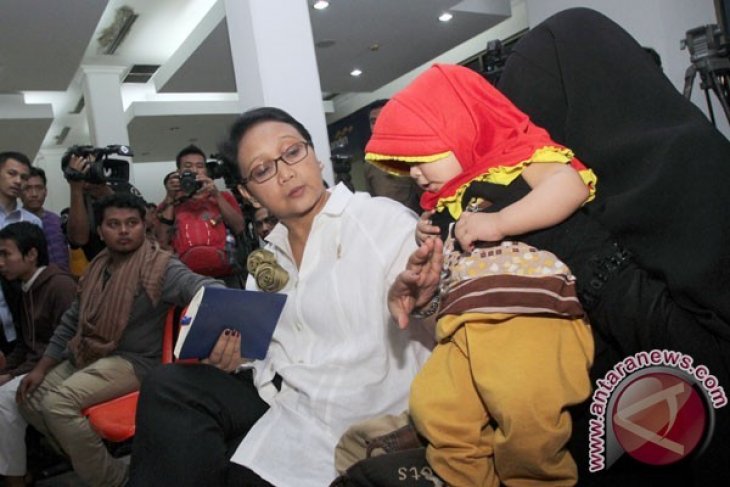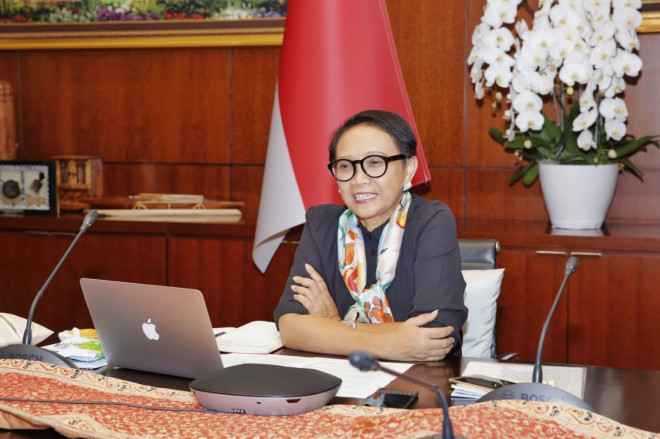Live Streaming
Program Highlight
Company Profile

Ani Hasanah
The Indonesian government's task force for COVID-19 handling has reiterated that discipline in applying health protocols would be key to preventing a second wave of coronavirus transmissions in Indonesia.
"There is a chance of a second wave (of COVID-19 transmission) if the public does not adhere to the government's protocol. Self-discipline to follow a healthy lifestyle is the recommendation to avoid a second wave," head of the expert team of the Task Force for the Acceleration of COVID-19 Handling, Wiku Adisasmito, said during a virtual press conference in Jakarta on Thursday.
Such discipline must be maintained by all people, not just those living in COVID-19 red zones, he advised.
"Because what happens in regions will have an impact at the national level," he reiterated.
The task force, he continued, has prepared necessary measures in anticipation of the second wave of COVID-19 transmission. However, active public participation is needed to stem the spread of the virus, he said.
The regional COVID-19 task forces have been assigned the job of monitoring the development of the outbreak in their regions while encouraging the public to play an active role by applying health protocols in their daily life.
The health protocols include staying at home, except for emergency reasons, washing hands with soap, wearing masks when venturing outdoors, and maintaining physical distance from others.
"We cannot do this alone. We need public participation to fight against the pandemic," Adisasmito remarked.
Some countries such as China and South Korea have experienced a second wave of COVID-19 infections, after the emergence of new positive cases in some cities.
As of Wednesday (April 13, 2020), the number of confirmed COVID-19 cases in Indonesia have reached 15,438, with 3,287 recoveries and 1,028 deaths.
Meanwhile, the number of people under surveillance (ODP) has reached 256,299 and patients under surveillance 33,042. (ANTARA)
May
Indonesian Foreign Minister Retno Marsudi averred that no peacekeepers from Indonesia had been infected with COVID-19.
"Until now, no Indonesian peacekeeping forces had been infected with COVID-19. However, we remain vigilant and stay abreast of developments on the field," the minister noted during an online press conference from the Jakarta Presidential Palace, Thursday.
Based on the UN Secretariat data, COVID-19 cases were confirmed in 13 countries and territories that have peacekeeping forces (PKO).
Speaking in connection with the data, Foreign Minister Marsudi stated that 64 peacekeeping personnel had contracted COVID-19, with most cases appearing in Mali.
"Of these, 23 have recovered," the minister revealed.
As one of the biggest contributors to the UN peacekeeping force, Indonesia has paid significant attention to the safety and health of troops, especially in the current pandemic.
Indonesia is continuously monitoring the situation in conflict areas, which is exacerbated by the COVID-19 outbreak due to limited health infrastructure, fragile security, challenging economic situations, and humanitarian conditions.
Marsudi pointed to the impact of the COVID-19 pandemic on the implementation of the peacekeeping forces' mandate, including difficulties in connecting with conflicting parties, in order to undertake their peace and mediation efforts.
The outbreak has also limited movements and activities of peacekeeping personnel, as well as humanitarian and logistical access, in addition to posing rotational difficulties on account of the unavailability of transportation and air travel.
"Hence, during meetings of the UN Security Council, Indonesia has always stressed on the importance of the safety, security, and health of peacekeepers," Marsudi pointed out.
To this end, Indonesia has also sponsored the United Nations Security Council (UNSC) Resolution 2518 on the safety and security of peacekeepers. The resolution was passed on March 30, 2020.
The United Nations Security Council
As a non-permanent member of the UNSC, Indonesia also welcomed the UN secretary general's call for a global ceasefire to facilitate the delivery of humanitarian assistance in conflict areas.
Indonesia, along with other members of the Security Council, actively participated in formulating the draft UN Security Council resolution on the requisite steps to overcome COVID-19 challenges in the fields of peace and security.
"Unfortunately, a consensus had yet to be reached on this draft resolution," Marsudi remarked.
Marsudi stated that the longer the UNSC took to reach an agreement on the draft resolution, the greater would be the negative signals sent on the ground, and it could also aggravate the situation in several conflict areas.
"All members of the UN Security Council must concentrate on increasing cooperation to protect people in conflict areas. Indonesia is ready to continue to contribute in negotiating the draft resolution at the UNSC," Marsudi stressed. (ANTARA)
May
 Foreign Minister Retno Marsudi (left) speaks to an Indonesian woman who landed at the Soekarno-Hatta Airport from Yemen recently. (ANTARA FOTO)
Foreign Minister Retno Marsudi (left) speaks to an Indonesian woman who landed at the Soekarno-Hatta Airport from Yemen recently. (ANTARA FOTO)
A total of 95,102 Indonesians have returned from abroad as of May 13, 2020 in wake of the COVID-19 pandemic, Foreign Minister Retno Marsudi said on Thursday.
"Most of them returned from Malaysia and were working for cruise ships," she said during an online press conference at the Presidential Palace in Jakarta.
She said 74,817 Indonesians have returned from Malaysia, and 64 percent of them traveled by sea.
By May 13, 2020, a total of 15,820 Indonesian crew members of cruise ships have also returned from 21 countries, she added.
Most of them returned home via the Soekarno-Hatta Airport in Banten Province and the Ngurah Rai Airport in Bali Province.
Because of the COVID-19 pandemic, many Indonesian migrant workers, particularly those employed in the informal sector in Malaysia, have lost their jobs.
In the wake of the COVID-19 pandemic, President Joko Widodo (Jokowi) has instructed the ministries to take precautionary measures for the return of 34 thousand Indonesian migrant workers, whose work contract will end in the months of May and June this year.
"Precautionary measures must be taken against this, and adequate preparations must be made. We should handle their arrivals through certain entry gates and monitor their movements to their hometowns," Jokowi stated during a videoconference on the acceleration of COVID-19 handling at the Merdeka Palace here on Monday. (ANTARA)
May

The government has prepared Rp3.1 trillion in subsidy for participants of two schemes offered by the Health Care and Social Security Agency (BPJS Kesehatan), Director-General of Budget at the Ministry of Finance, Askolani, said.
The subsidy will cover members of BPJS Kesehatan’s third-class non-wage recipients (PBPU) and non-employee (BP) schemes, he added.
"The government has committed and included in the 2020 budget (subsidies) worth Rp3.1 trillion," Askolani stated at an online discussion on Thursday in Jakarta.
Askolani stated the government regulation (Perpres) No. 64/2020 on the second amendment of Perpres No. 82/2018 on health insurance stipulates that the third-class service premium for non-wage recipients (PBPU) and non-employee (BP) schemes has increased to Rp42,000, and will take effect in the month of July this year.
However, participants of the schemes would only be obliged to pay Rp25,500, and the rest would be subsidized.
Askolani said the subsidy was being given after the government had considered and adjusted for current conditions in wake of the COVID-19 pandemic.
Not only that, under Perpres 64/2020, the central and regional governments would provide subsidies for next year's contributions to the participants in the amount of Rp7,000, Askolani stated.
As a result, participants will only have to shell out Rp35,000.
Askolani stressed that the policy would promote the common good by maintaining the continuity of Indonesia's national health insurance (JKN) program in the short and long term and improve services.
"The government is in the front to protect people who are unable to get healthcare from the state. The management of BPJS funding in 2020 will be much better compared to 2019,” he declared.
Meanwhile, he said, public participation in the JKN program would be carried out through a single door, under the purview of the central government.
The premiums of contribution assistance recipients (PBI) will be covered by the central government.
The premium charged by BPJS Kesehatan for participants of class II non-wage recipients (PBPU) and non-employee (BP) schemes has been set at Rp100,000, and for class I members at Rp150,000, which would be effective starting July, 2020, as noted in the Perpres 64/2020. (ANTARA)



